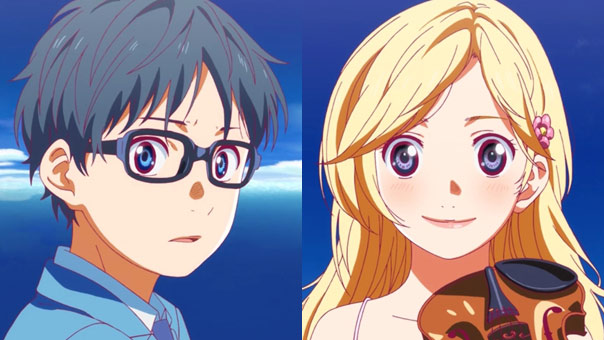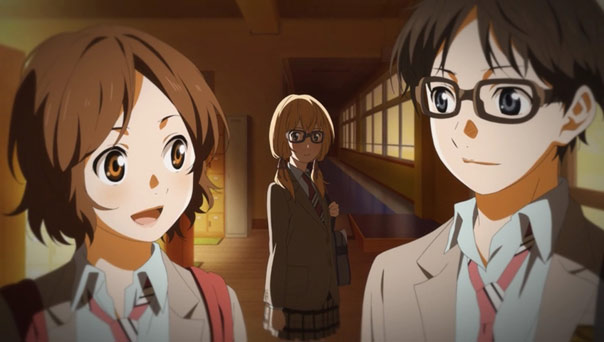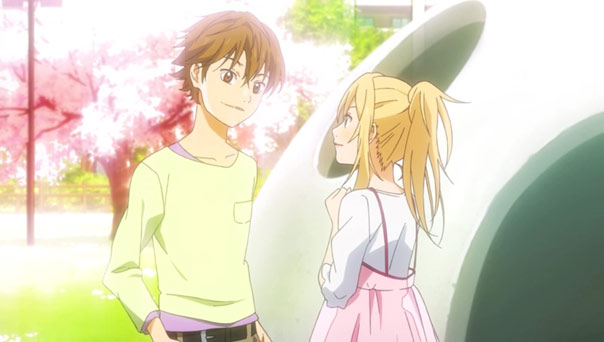BRAVO. Violin Girl had its ups and downs this cour, but really came through with a stirring and satisfying finale that looks back upon where Kousei has been, explore where he is in the present and what he’s become, and hints at where he’s poised to go, not long after a certain devastating yet inevitable development comes to pass.
First of all, Kousei draws power from everyone who has helped him (most of whom are in the audience) and finds the sound within him, delivering by far his best performance. Entering a serene environment of still water and deep blue sky, the Kaori inside of him coalesces, not just to cheer him on, but to play violin along with him…one last time.
It’s an exceedingly beautiful, sad, but ultimately uplifting performance, and to the show’s credit, everyone shuts up for a few minutes so we can simply listen and get lost in the wall of sublime sound. Now, if you’re not a Chopin fan, you’re probably not going to like this, but I’m just fine with him, and it was a transcendent sensory experience I hoped would never end.
But at one point in the piece Kaori lowers her bow and begins to fade away, then light explodes violently from her core, to Kousei’s despair. Yet he doesn’t freeze. He keeps his head up and watches her disappear. He’s no longer playing with her, he’s playing for her, and for everyone else who got him to where he is: once again pouring his heart and soul into a Steinway.
When the piece ends at the episode’s halfway point, there’s no delayed applause nor the usual post-performance victory fanfare. There’s only silence, and Kousei’s tears streaming down his face. He says goodbye.
And that’s it.
When the B-part begins, there’s no mention of who won (probably Kousei), nor how Kaori’s operation went. The first scene is of cars trudging through the snow (something I’ll probably have to do tomorrow, despite the fact it’s the first day of Spring!). The second is Kousei in a graveyard with Koari’s parents. The operation didn’t work, and she has passed away.
Yet Kousei isn’t so overcome by grief that he cannot function as a person; he’s grown up. He also got to play with her one last time, if only in his head.
Kaori’s folks give Kousei a letter from Kaori, affixed with the telling black cat sticker, her narration (and Kousei’s reaction) to which comprises the rest of the episode. This letter provides Kousei closure, but also fresh insight into his dearly departed love.
Kaori first saw Kousei long before he spotted her in that playground. As a five-year-old, she was an aspiring pianist herself, who was affected so powerfully by lil’ Kousei’s performance, she ran straight home (Unattended five year olds! Japan!) and asked her parents to buy her a violin. Kousei was the reason she played a violin at all.
Kaori continued to admire Kousei when they started attending the same school, but only from afar, as she was intimidated by the strong bond between him and Tsubaki. But the fact that Ryouta was beside them meant she’d have a chance to make Kousei notice her. To make that happen, she told the titular Lie In April: the lie that she liked Ryouta.
Like the fact that she started playing violin so she could play beside Kousei, this lie comes as more of a confirmation rather than a surprise: it was clear pretty early on, despite all the teasing and flirting to the contrary, Kaori and Kousei had a lot more going for each other than Kaori and Ryouta, who was fun and nice and attractive, but not much more than that. Ryouta knew this too; he could never hold a candle to the power beyond words that music brings to the table.
For all of the cursing of music for tearing Kousei’s mom away from him, or Kousei away from Tsubaki, or Kaori away from Kousei, Kousei doesn’t give up on music just because Kaori passes away. To do so would’ve meant he’d learned nothing from her. Instead, as we see, he’s grown into a cooler, more mature musician.
In the end, music brought Kaori to him from the start; and though she was only “passing by”, she was able to bring him back to it, and it brought them together once more in his last performance with her. And as she wished, he will never forget her. If he does, she’ll haunt his ass.
That brings us to Tsubaki, who isn’t sure how to approach Kousei after Kaori’s passing, knowing he loved her deeply. Kashiwagi, armed with 108 BL books’ (and zero boyfriends’) worth of romantic wisdom, tells Tsubaki to simply stop turning the gears in her head and simply listen to her heart and act the way she usually does with him.
It works. In one last violent slapstick act that actually felt appropriate and earned, Tsubaki kicks Kousei in the shin and tells him in no uncertain terms that he’d better not ever think he’s alone ever again, because she’s never going to leave his side. Kousei is just fine with that, and so he should.
Kaori was the love that, rather than never was, was only a corporeal thing ever so briefly, like trees blossoming at the start of spring. Tsubaki was in his life before Kaori appeared, was there throughout his fleeting romance with Kaori and remains there for the long haul. I wish them both all the best.
The show closes with a look at the random old photo Kaori included with her letter, of her posing with a friend. But it’s significant because a little Kousei is in the background walking past, with his mother’s stern foot just in the frame.
Ten years ago, this photo captured a moment when Koari and Kousei were so very close together, and both looking at the camera, and yet neither knew the other was in it, and in Kousei’s case, didn’t even know wouldn’t even formally meet the girl until ten years later. But not only did they meet, but she lifted him out of his deep soundless sea, he gave her a stirring sendoff and vowed to continue playing with everything he has as long as he has it.
Ill fate tore them apart too soon, but even if that photo and all other photos fade away with time, she’ll always live on in Kousei, the year or so they spent together and the music she made and helped him make etched eternally in his heart.
Once again: Bravo.
Final Series Score: 9.05


















Will definitely agree that this was a great close, albeit with a few overly meldramatic moments (honestly, I would have preferred a more subtle treatment than that lights show in Kousei’s performance). The second half is undoubtedly the highlight here though, with its much more sublime run.
Sadly, the series as a whole really comes short. For one, the show never really managed to get rid of that pretentious air (which I have already mentioned before). And while it can deliver the feels (which is, narratively speaking, fairly easy to do), it never goes beyond and get that lasting emotional connect.
The biggest problem here is how the show handled Saki’s character, who is the biggest underpinning character in the series, much bigger than even Kaori. By presenting her as a grinning, blank-eyed, abusive parent for almost the entirety of the first half, the show never managed to let the audience sympathize with her, and hence, empathize with Kousei.
Saki’s reasons for her actions are also very flimsy. She said that she just wanted to ensure that Kousei has a means to live, since all he has is music. But the woman is practically the same reason why music is the only thing that Kousei knows, since she never really let the kid run off and find what he truly wants (human metronome, eh). She comes off more as a bitch who obsessively wants to leave a legacy behind rather than a caring parent who is desperately trying to ensure the future of her kid. And what’s even the say of Kousei’s dad here?
Kaori also gets out of focus for much of the middle part, which is really sad, since it could have given the second half of this episode (which is, as I have said, good) a good ground to stand on, to make it even better. When it comes to writing a love story, even if it is told from the POV of only one person, you still need to build up the other party’s character to make it emotionally complete, which the show kinda fails to do for Kaori.
And before I forgot, the show’s story is ultimately not about Kousei rediscovering his passion for music, for which he actually has none, since all he has of it are sad memories, but of him discovering why his mother is so passionate about music. Which itself falls really short because of the way the series horribly presented Saki.
LikeLike
Will definitely agree that this was a great close…it can deliver the feels…
Haha, glad we’re in agreement about something!
LikeLike
I know. I would have also given the series a high regard if not for the whole domestic/child abuse angle, which it really didn’t sufficiently address, and which also had a nasty side effect of putting Kaori’s and Tsubaki’s otherwise comedic harassment of Kousei into such a bad light.
LikeLike
The show certainly backed itself into a corner with Kousei’s mom. It’s as if they knew they’d gone too dark to possibly meld smoothly with the zanier comedic tones of the show, but really couldn’t fix what they’d already done with her.
Once Kousei got over the musical “block” caused by the trauma she caused him (and lets be clear, nothing that happened to him was his fault, he was just a little kid trying to make mom happy), Kousei moved on to Kaori.
When it was clear she would also die, I’m glad history doesn’t repeat itself. Kousei has grown; physically and mentally, and he’s able to say goodbye properly.
The visual effects the musical performances brought out are obviously a matter of taste. While over the top at times, I still enjoyed the fact the animators were attempting to visualize not just the music, but the passion all these musicians feel for it.
That being said, there’s something to be said for unembellished, “naturalistic” shots of Kousei’s performance, in which camera angles and lighting transform the mundane venue into something more monumental, and creates a magical atmosphere while letting the music stand on its own, without any “light shows.”
Having little kids so eloquently describe what they’re feeling while listening is problematic, insofar as the few live classical musical performances I’ve been to, the show never failed to transport me into its musical world.
LikeLike
That’s a bad predicament that the show could have actually avoided if they had simply faced the whole domestic abuse part of Saki’s character head on. Instead, the show frantically tried to skirt around the topic, first by making Hiroko the scapegoat (with her continuously mouthing that she is to blame for Saki’s actions, then by hastily trying to redeem Saki herself in just two episodes.
The thing is, domestic abuse is a really sensitive issue that you don’t simply open and then back off halfway just because you realize it’s “too dark” for you. It’s either you confront it or you don’t open it from the start. The way the show handled this one really hurt its sincerity big time.
As for Kaori, while I do like the part of Kaori acknowledging that she was indeed very abrasive towards Kousei, I really wished that they have shown her realization (as well as the other parts of her personality shown in second half of the episode) throughout the series, and not just cram it in the last part, so as to make her a more rounded character, and not deified (as other reviewers put it) as the quintessential anime good girl after her death.
LikeLike
This is one of the best anime i ever watched. There should be more animes’ like this.
” Your Lie In April”. Absolutely brilliant.
LikeLike
I was really happy how they ended it. While they could have taken the easy way out and had Kaori live they didn’t, but resolved her death without despair and depression. I thought it was done well.
LikeLike